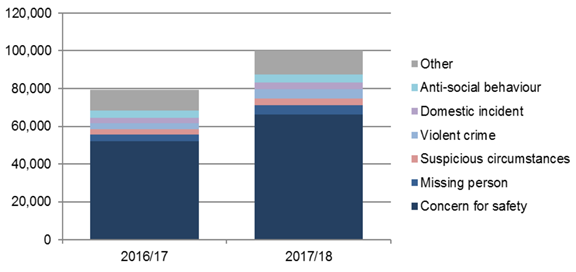
Five people made 8,655 calls to the Metropolitan Police in 2017 for mental health related incidents. This has cost £70,000 to answer.
A watchdog for police in England and Wales released the figure to show how police have become a default service to deal with people that have mental health. The mental health system is said to be “broken” by her Majesty’s inspectorate of Constabulary and Fire and Rescue Service.
Police respond to a mental health call every day and it is important that they recognise the importance as early as possible due to the level of urgency that may be needed to help an individual. Mental health affected one in four of us at some point in life and they are the most vulnerable in society.
The Home Office said it was investing in the mental health sector and praised the police for their leadership in the area. The Police Federation said the prime minister and the home secretary “should hang their heads in shame”.
The figures belong show the police figures for mental health:
- In London, police receive a call about mental health concerns every four minutes and send an officer to respond to the call every 12 minutes.
- Welsh forces estimate that each call they go out on for mental health- related issues take on average 3 hours to deal with.
- Half of the mental health calls received are solved by the police rather than an ambulance service as they just transport people to safety.
For the police forces in England and Wales, 2.8% of recorded incidents were flagged to identify mental health concerns. Five forces in England and Wales could not give us any data on flagged mental health incidents.
The HMICFRS made a report on policing and mental health and stated: “There was notable variation between forces. For example, Durham Constabulary flagged 7.4 percent of their calls as related to mental health. North Wales Police flagged only 0.4 percent of all calls. The command and control systems vary between forces; some have a bigger range of flags to determine the nature of the call. Some command and control systems can’t flag mental health-related calls. All systems rely on a member of the workforce manually applying the flag. This is where a combination of good training and supervision of call handlers will help.”
Forces have several programs to try and improve their responses to mental health related incidents. The aim is to try and reduce the number of people that are detained under section 136 the Mental Health act 1983. This act means that officers can remove a person to a safe place if they are in urgent need of care or control.
A spokesman for the Home Office said the police had worked closely with the NHS to reduce the number of people held in police custody as a place of safety – numbers have gone down by 95% since 2011/12.
In June 2017, there was 97,796 crimes which flagged mental health concerns in 38 forces. This represents 2.4% of crimes in England and Wales which is an increase of 0.2% since 2016.
Below is a graph to show recorded incidents increase, as you can see the biggest increase is the concern for safety.
